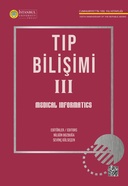Explore

Tıp Bilişimi III
0 Ungluers have
Faved this Work
Login to Fave
Editor Nilgün Bozbuğa, Sevinç Gülseçen
The main goal of the use of information technologies in medicine is to increase efficiency, productivity and quality in health services. In healthcare, traditional complex health service systems are increasingly replaced by smart systems that can be monitored and controlled in real time. Intelligent systems equipped with digital technology opportunities have started the “Health 4.0” era in health care fields. The definitions of “Health 4.0” and “Smart Health” are used in parallel with the “Industry 4.0” period, in order to emphasize the cyber-physical determinants of health, symbolizing real-time information provision and access to holistic health care.
One of the most important reasons why the concept of smart health has become popular is the concept of big data produced in medicine as well as in all areas of life. The enormous size and variety of data, whether real-time or timestamped, structured or unstructured, continues to grow in healthcare. Clinical artificial intelligence applications, which include more efficient and faster technological solutions in the production of health services, and which aim to increase the health level of individuals and improve their quality of life, are becoming widespread with approaches to improve health services by analyzing health data.
In addition to the use of artificial intelligence in the administration of health services, performance and capacity increase, original models are also created in the management of health services. The use of informatics approaches in diagnosis, treatment and care processes, the developments in digital imaging technologies, the use of robotic systems in surgery, the widespread use of modeling and simulation technologies in medical education make a difference in the functioning of health institutions. Despite the disadvantage of high initial investment costs, artificial intelligence technologies in the field of health contribute greatly to measurement, diagnosis, treatment management and follow-up activities with their facilitating and adaptive effects.
Although conceptual and technical studies on the future of artificial intelligence applications continue, it is not possible for artificial intelligence systems to display the ability for emotional intelligence, which requires design, adaptation and intuition, and to perform multitasking similar to the human brain. As in the field of informatics, there are still concerns about ethical reasoning responsibility and ethical decision making in artificial intelligence applications in medicine.
In the third book of the series published by Istanbul University Press in medical informatics, the applications of medical informatics and artificial intelligence in medicine are discussed with a multidisciplinary approach and broad perspective. In particular, telemedicine and out-of-hospital patient management issues, which allow health service delivery to be provided without time and space limits, are handled with public regulations specific to the coronavirus pandemic period.
This book is included in DOAB.
Why read this book? Have your say.
You must be logged in to comment.
Rights Information
Are you the author or publisher of this work? If so, you can claim it as yours by registering as an Unglue.it rights holder.Downloads
This work has been downloaded 17 times via unglue.it ebook links.
- 17 - pdf (CC BY-NC) at Unglue.it.
Keywords
- Computer science
- Computing & information technology
Links
DOI: 10.26650/B/ET07.2023.005Editions

